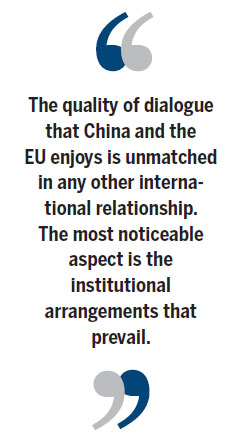Respect, dialogue underpin partnership
Updated: 2015-01-16 10:23
By Jing Men(China Daily Europe)
|
|||||||||||
Investment and environment two key issues in China-EU relationship in year ahead
This year is a particularly important one for EU-China relations, when both sides will celebrate 40 years of diplomatic ties. Just as many of those in their 40s regard those years as the most fruitful years of their lives, the EU-China relationship has matured into a prospering partnership, one that is characterized above all by mutual respect. Despite the different ways in which the two sides sometimes see things, they endeavor to work jointly to serve their common interests and to solve problems through dialogue.
Just as respect underpins the relationship between China and the EU, dialogue is a key element in making that relationship work.
The quality of dialogue that China and the EU enjoys is unmatched in any other international relationship. The most noticeable aspect is the institutional arrangements that prevail. In three areas, political dialogue, economic and sectoral dialogue, and people-to-people dialogue, Beijing and Brussels have strengthened their collaboration and exchanges on many issues.
The first big event in EU-China relations this year will be a summit meeting between Brussels and Beijing. The 16th EU-China summit in November 2013 gave birth to the EU-China 2020 Strategic Agenda for Cooperation.
We can expect some fine-tuning of that agenda and that more policy and collaboration projects will be made public at the coming 17th summit between Chinese Premier Li Keqiang and new EU leaders Jean-Claude Juncker and Donald Tusk in the coming few months. Under the auspices of the summit there will be other talks this year, and several dialogues at ministerial level will be organized in Brussels.
Investment is another keyword in EU-China relations. Juncker announced a 315 billion euro ($373 billion) investment plan after he became president of the European Commission in November. With such a big investment, the commission intends to stimulate growth and create jobs, which is, to a certain degree, in line with the Chinese grand strategy of the New Silk Road - the Silk Road Economic Belt and the 21st-Century Maritime Silk Road - the initiative that Chinese President Xi Jinping launched in late 2013. Both will reach Europe, meeting each other in Venice.
Huge investment lies behind the idea of China and all the other countries along the belt and the road being connected with one another. Last year Chinese leaders promised to create a $40 billion (33.7 billion euros) Silk Road infrastructure fund and a $3 billion investment fund for Central and Eastern European countries. Juncker's plan focuses mainly on the less developed member states of the EU in the South and the East, where China has already undertaken a number of big cooperation projects, such as the Piraeus port and the Budapest-Belgrade Railway. If the EU and China can coordinate their investment in these regions, everyone will win.
Almost needless to say, China's investment in the EU will be closely related to negotiations for an EU-China investment agreement. Such an agreement is expected to provide a steady, transparent, predictable and open legal framework for investors from both sides. After several rounds of negotiations last year, this year is crucial for more items to be agreed on between the two sides.
In particular, against the backdrop of talks on a Transatlantic Trade and Investment Partnership between the EU and the United States and the Trans-Pacific Partnership between the US and 12 countries, the conclusion of the investment agreement with the EU is very important for China to be on the side of rule-making instead of rule-taking in international relations.
Green will be a key word not only for EU-China bilateral relations, but also for multilateral relations this year, with the global climate conference being held in Paris in November. Leaders from both developed and developing countries are expected to sign an agreement to limit greenhouse gas emissions from 2020 on. The EU used to regard itself as a leader in the field of climate change, yet it realized after talks in Copenhagen five years ago that without cooperation from both the US and China, no deals could be made.
The Sino-US agreement on emissions in November showed that the two most important climate change players have joined the EU in committing to new limits on greenhouse gas emissions. This paved the way for a new international agreement to be adopted in Paris this year. But it remains to be seen whether the three, together with leaders of other countries, will hold global warming within safe limits. This year will end either with a breakthrough in green efforts or with a breakdown in efforts to curb global warming.
The author is director of EU-China Research Centre and InBev-Baillet Latour Chair of EU-China Relations.

(China Daily European Weekly 01/16/2015 page10)
Today's Top News
Italian president resigns
British hospital says has suspected Ebola case
Putin not to attend Auschwitz events
Turkey to help in foiling suspects from Xinjiang
Black Box of crashed AirAsia jet retrieved
Arson attack at paper that ran Charlie Hebdo cartoons
Improved screening to secure safe blood transfusion
Ambitious course set for global airliner market
Hot Topics
Lunar probe , China growth forecasts, Emission rules get tougher, China seen through 'colored lens', International board,
Editor's Picks

|

|

|

|

|

|





